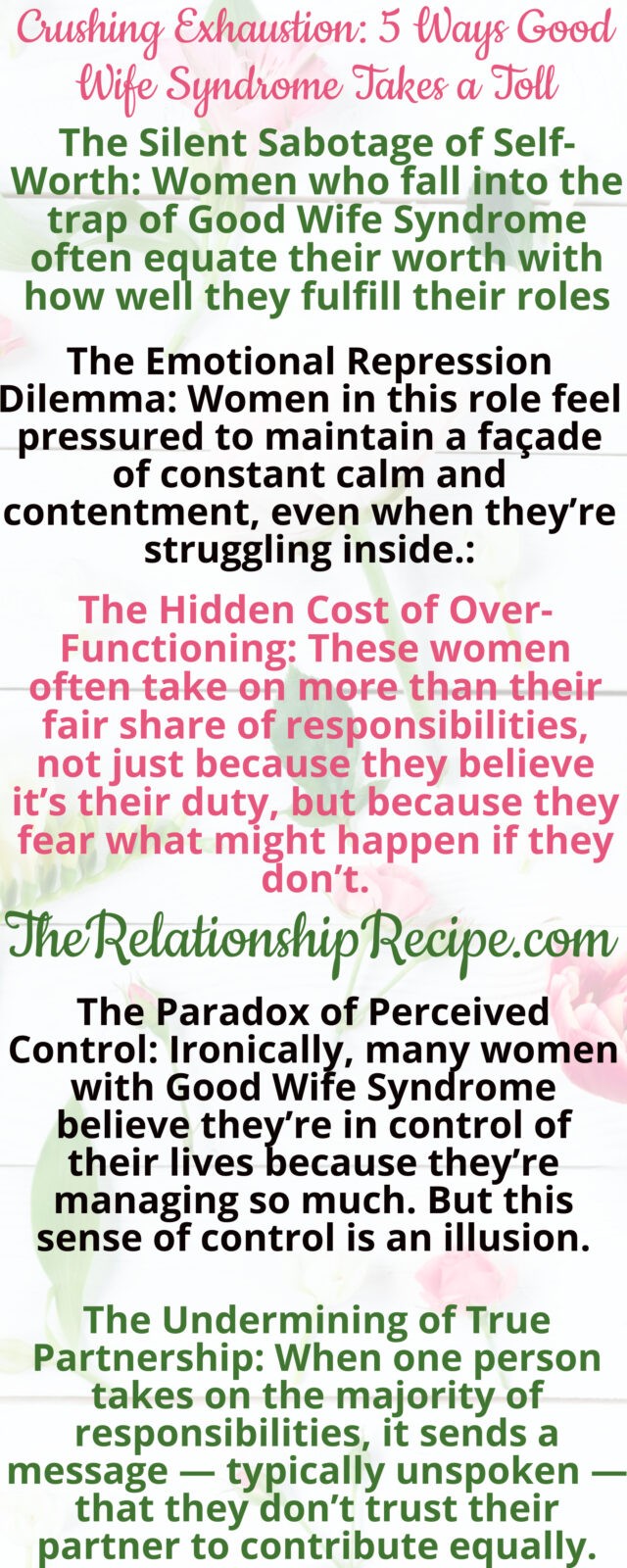The “good wife” … society glorifies her. She’s the epitome of selflessness, always putting her family first, sacrificing her needs without hesitation. She maintains an immaculate home, raises perfect children, and supports her husband unconditionally.
But beneath this polished exterior lies a silent struggle. Good Wife Syndrome isn’t just about traditional gender roles or being overly accommodating; it’s an insidious cycle of perfectionism that drains women emotionally and mentally, often in ways that aren’t immediately obvious.

I’ve previously written posts about how Good Wife Syndrome can lead to Walkaway Wife, as well as the many ways being that perfect wife leads to divorce. But what if it’s not bad enough to leave, or you can’t leave, yet you are bone tired? I don’t mean just physically worn out, I mean the mental and emotional toll this plays on wives everywhere.

How Good Wife Syndrome Takes an Exhausting Toll
🚩1. The Silent Sabotage of Self-Worth
Women who fall into the trap of Good Wife Syndrome often equate their worth with how well they fulfill their roles. The more they try to be perfect, the more they tie their self-esteem to their ability to meet impossible standards.
This relentless pursuit of perfection creates a distorted sense of identity, where a woman only sees herself through the lens of how well she serves others.
Over time, this erodes self-worth, making her believe that any failure in her roles, no matter how small, is a reflection of her inadequacy as a person.

🚩2. The Emotional Repression Dilemma
Good Wife Syndrome typically leads to emotional repression. Women in this role feel pressured to maintain a façade of constant calm and contentment, even when they’re struggling inside.
They internalize their frustrations, disappointments, and desires because expressing them would disrupt the peace or paint them as selfish.
This emotional bottling isn’t just exhausting; it’s dangerous. It can lead to anxiety, depression, and even physical health problems as the body reacts to the constant stress of suppressing emotions.

🚩3. The Hidden Cost of Over-Functioning
One overlooked aspect of Good Wife Syndrome is the tendency to over-function in relationships. These women often take on more than their fair share of responsibilities, not just because they believe it’s their duty, but because they fear what might happen if they don’t.
This over-functioning allows others to under-function, creating a toxic dynamic where the woman does everything, and her partner becomes increasingly passive.
This imbalance doesn’t just lead to burnout; it cultivates resentment and disconnection in the relationship, as the woman begins to feel like she’s carrying the weight of the world on her shoulders.

🚩4. The Paradox of Perceived Control
Ironically, many women with Good Wife Syndrome believe they’re in control of their lives because they’re managing so much. But this sense of control is an illusion.
In reality, they’re frequently reacting to external pressures and expectations rather than making choices based on their desires or needs. This paradox keeps them stuck in a cycle where they’re constantly trying to live up to standards that aren’t truly theirs, all while feeling increasingly out of touch with who they are and what they want.

🚩5. The Undermining of True Partnership
In trying to be the perfect wife, women often unintentionally undermine the possibility of a true partnership. When one person takes on the majority of responsibilities, it sends a message that they don’t trust their partner to contribute equally.
This dynamic can diminish the partner’s sense of agency and involvement, leading to a relationship that’s more about roles than real connection and closeness. The woman’s desire to be perfect not only exhausts her, but also prevents the relationship from growing into a balanced, mutually supportive partnership.

The Cycle of External Validation
Good Wife Syndrome is often fueled by a need for external validation. These women seek approval from their partners, families, and society at large, typically without realizing that this external validation is a double-edged sword.
While it may provide temporary satisfaction, it ends up deepening their dependency on others’ opinions. This reliance on external validation makes it difficult for them to recognize their own worth, perpetuating the cycle of overwork, over-functioning, and emotional bottling up.

The Loss of Authentic Joy
The most tragic part of Good Wife Syndrome is the loss of real joy. In their relentless pursuit of perfection, these women often forget what truly makes them happy.
They become so focused on meeting others’ needs and expectations that they lose touch with their passions, hobbies, and dreams. This disconnection from their authentic selves leaves them feeling empty and unfulfilled, even as they appear to have it all together on the outside.

Wrapping Up: Breaking Free from the Cycle
Escaping Good Wife Syndrome requires a big change in perspective. It’s about redefining what it means to be a “good” wife, not in terms of self-sacrifice and perfection, but of authenticity and balance. It’s about recognizing that true partnership involves shared responsibilities, mutual respect, and the freedom to be imperfect.
Most importantly, it’s about reclaiming one’s identity, self-worth, and joy, not as a reflection of how well she serves others, but as a celebration of who she is at her core.
Good Wife Syndrome may seem like a noble thing, but its price is way too high. Perfection, in this case, is not just unattainable: it’s exhausting, isolating, and totally unsustainable. The journey to break free from this cycle is challenging, but it’s also essential for any woman who wants to live a life that’s truly her own.

This post may contain affiliate links. I earn from qualifying Amazon purchases at no extra cost to you.





